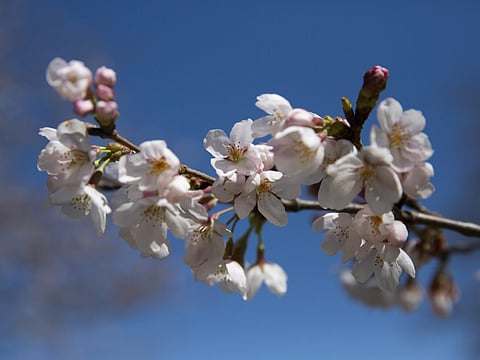The ‘wilderness’ no longer exists
Indigenous history shows there’s nothing inevitable about the carnage being unleashed now

When the colonists arrived in Australia, they saw themselves as conquering both the continent’s land and its people. In many respects, they didn’t differentiate between the two.
The Bible commands believers (in Genesis 1:28) to “replenish the earth, and subdue it: and have dominion over the fish of the sea, and over the fowl of the air, and over every living thing that moveth upon the earth”.
That injunction informed terra nullius.
The settlers never believed Australia empty. They knew of its Indigenous inhabitants. But they didn’t believe the natives practised agriculture — and without agriculture (that “subjugation of the land”) the continent could, they thought, only be a wilderness.
The remarkable, slow-building success of Bruce Pascoe’s book Dark Emu has done much to educate white society about how wrong the settlers were.
Indigenous people did practise agriculture — they just did so in a different way.
The “wilderness” that the settlers saw actually represented the work of Indigenous people over tens of thousands of years, systematically and consciously burning to encourage certain plants and animals, and discourage others.
It was only because of human labour that the land, as Bill Gammage notes in The Biggest Estate on Earth, reminded explorers and colonists of the manicured parks treasured by English noblemen.
The work of Pascoe and others should matter to all Australians because of its implications for racial justice. But it also offers hope in the midst of the current environmental emergency.
At the frontier, the settlers understood themselves at the front line in a battle between (white) people and nature. On one side stood civilisation, knowledge, culture, religion and everything else that distinguished humanity from other species; on the other lay a wilderness, desolate spiritually and physically.
Later, many environmentalists simply reversed that polarity.
Seeing the destruction wreaked by industrialisation, they judged the cities stultifying rather than ennobling. Nature mattered, they thought, because of its uncontamination by humanity.
“In wildness,” explained the pioneering American naturalist Henry David Thoreau, “is the preservation of the world.”
That kind of Romanticism spurred many of the great environmental battles in Australian history.
During the crucial struggle to prevent the Franklin Dam, for instance, the Wilderness Society argued that “the advocates of wilderness are linked by an intuitive conviction that to destroy these last fragments of wild Earth is akin to destroying ourselves”.
From where we are today, the problems with that well-meaning rhetoric become far more apparent.
In the Australian context, an environmentalism that defends “wilderness” negates Indigenous history and unwittingly revives terra nullius.
Furthermore, as Emma Marris argues in her book Rambunctious Garden, it leads, in the 21st century, to a deep pessimism.
“We cling,” she writes, “to fragments of ‘virgin’ or ‘old growth’ forests, to the ‘last great places’, the ever-rarer ‘intact ecosystems,’ but they slip through our fingers. Like slivers of soap, they shrink and disappear. And we mourn. We are always mourning, because we can’t make more of such places. Every year there are fewer of them than the year before.”
In the era of the Anthropocene, with the presence of humanity felt all across the planet, wilderness — if by that we mean land untouched by people — no longer exists.
That’s why it’s liberating to recognise that it never really did.
In every continent, humanity has always shaped nature, just as nature has always shaped humanity.
In Britain, many of the most beautiful “ancient woodlands” were deliberately planted centuries ago as a source of timber, fuel or game, just as the distinctive English moors resulted from tree-felling during the Bronze and Iron Ages.
“The pristine wilderness notion,” Marris continues, “is a historically created idea about what ought to count as nature, and there is no reason why we can’t change it ... And we do change it, a heretofore unthinkable, exciting and energising thought occurs: we can make more nature. We can make things on Earth better, not just less bad.”
Indigenous history, in particular, demonstrates that we don’t need to assume an eternal antagonism between humanity and nature. We can change how we relate to the world, the specific form of our engagement with the planet.
As Pascoe argues, Aboriginal people collectively controlled their metabolism with nature, using custom, culture and law to regulate burning, hunting, planting and other forms of labour.
The colonists replaced that ancient system with a capitalist agriculture driven by the imperatives of individual enrichment.
As a result, as Eric Rolls explained in A Million Wild Acres, “thousands of years of grass and soil changed in a few years”, and the parklike meadows vanished.
Crucially, the incredibly rapid destruction wasn’t the consequence of population pressures or industrialisation in a still very small and underdeveloped colony.
What mattered was an economic shift: the destruction of a system that carefully regulated the human metabolism with nature, and the implementation of a system that rewarded those who looted the environment for individual gain.
Indigenous history shows there’s nothing inevitable about the environmental carnage being unleashed now.
Aboriginal Australians lived on the continent for at least 50,000 years — and that human presence improved nature rather than diminished it.
We urgently need to learn from that.
Sure, we can’t return to the world that existed prior to 1788. But we have access today to science that makes it possible to understand — and thus control — our metabolism with nature in ways that were previously available.
We don’t have to accept the anarchy of a capitalist production that’s done so much damage in so brief a time. We need, as a matter of urgency, a planned and democratic alternative.
–Guardian News & Media Ltd



